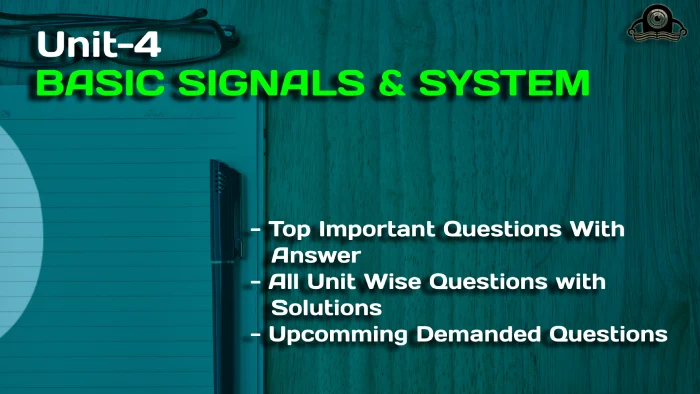In this section, we will examine UNIT 04 STATE VARIABLE ANALYSIS | Basic Signal and Systems -AKTU, subject “Electrical and Electronics Engineering”. I hope this article is useful to you as you prepare for your AKTU exams.
Dudes 🤔.. You want more useful details regarding this subject. Please keep in mind this as well. Important Questions For Basic Signals and Systems : *Unit-01 *Unit-02 *Unit-03 *Unit-04 *Unit-05 *Short-Q/Ans *Question-Paper with solution 21-22
Q1. What is state variable analysis ? Also define state and state variable.
Ans.
A. State variable analysis : It is best to construct a set of n first-order differential equation using a set of auxiliary variables called state variables, and this method is known as State Variable Analysis. An nth order differential equation is typically not suitable for computer solution.
B. Definition of the following terms:
i. State: The state of a dynamic system is the smallest set of variables such that the knowledge of these variables att = t0 with the of knowledge the input for t ≥ t, completely determines the behaviour of the system for any time t ≥ t0.
ii. State variables: State variables are the factors that contribute to the dynamical system’s determination of its state.
iii. State vector: These n state variables may be regarded as n components of a vector x if n variables are required to fully characterize the behaviour of a particular system. State vector refers to such a vector.
iv. State space: The n-dimensional space whose coordinate axes consists of the x1 axis, x2 axis…..,xn axis is called state space. Any state can be represented by a point in the state space.
v. State equation: A state space representation, also known as a state equation, is a mathematical representation of a physical system that consists of output, input, and state variables connected by a differential equation.
Q2. Obtain the state space representation of the system y + 65 + 11y + 6y = 6u where, y → output , u → input
Ans.
Q3. What is transfer function ? Also derive the expression for transfer function of a state model.
Ans. A. Transfer function: Under the premise that all initial conditions are zero, it is defined as the ratio of the system’s Laplace transform’s output to input.
B. Derivation:
Let us consider a vector matrix differential equation
2. Now, taking Laplace transform with zero initial conditions
3. For a single-input-single-output system, Y and U are scalars.
4. Now transfer matrix can be given as
Q4. Explain state transition matrix, its physical significance and properties.
Ans. A. State transition matrix: The matrix ф(t) = exp (At) is an n xn matrix and it helps in transition from initial state X(0) to any other staterit) for t > 0, hence ф() is called state transition matrix.
Derivation:
1. Consider homogeneous equation, with u(t) = 0
Q5. Find the state transition matrix for a system matrix
Ans.
Q6. Define controllability and observability in state variable analysis
Ans. A. Controllability:
1. If the desired state of the system can be changed over a specific time period by applying input, the system is said to be controllable.
2. Consider nth order multiple input linear time invariant system represented by its state equation as,
3. The necessary and sufficient condition for the system to be completely state controllable is that the rank of the composite matrix Qc is n.
4. The composite matrix Qc is given by,
B. Observability:
1. If all of a system’s state can be ascertained using information about the output of the system at a particular time, the system is said to be observable.
2. State equation
3. The system is completely observable if and only if the rank of the composite matrix Qo is n.
4. Composite matrix Qo is given by,



Important Question with solutions | AKTU Quantums | Syllabus | Short Questions
Basic Signal And System Quantum, Syllabus, Important Questions
| Label | Link |
|---|---|
| Subject Syllabus | Syllabus |
| Short Questions | Short-question |
| Important Unit-1 | Unit-1 |
| Important Unit-2 | Unit-2 |
| Important Unit-3 | Unit-3 |
| Important Unit-4 | Unit-4 |
| Important Unit-5 | Unit-5 |
| Question paper – 2021-22 | 2021-22 |
Basic Signal And System Quantum PDF: | AKTU Quantum PDF:
| Quantum Series | Links |
| Quantum -2022-23 | 2022-23 |
AKTU Important Links | Btech Syllabus
| Link Name | Links |
|---|---|
| Btech AKTU Circulars | Links |
| Btech AKTU Syllabus | Links |
| Btech AKTU Student Dashboard | Student Dashboard |
| AKTU RESULT (One VIew) | Student Result |

2 thoughts on “UNIT 04 STATE VARIABLE ANALYSIS | Basic Signal and Systems -AKTU”